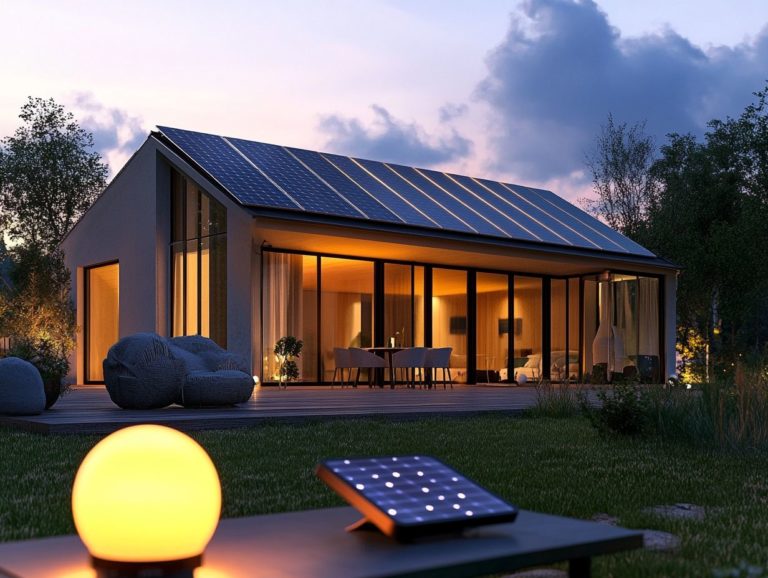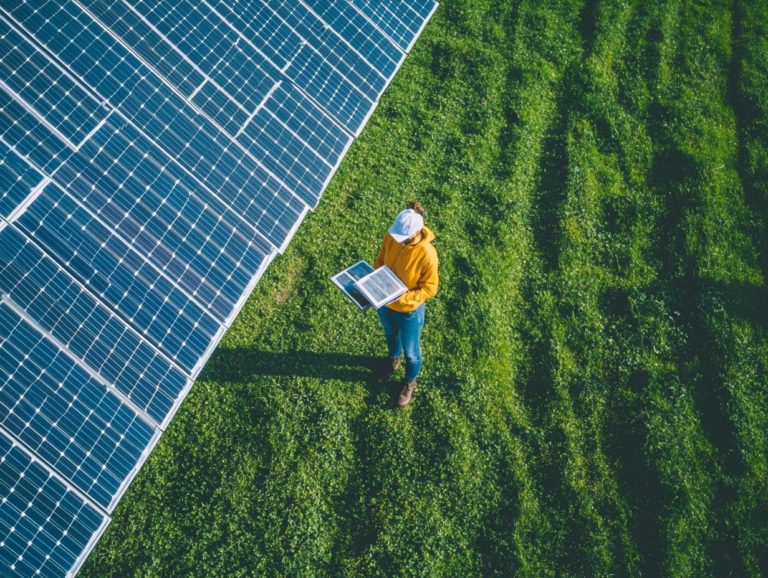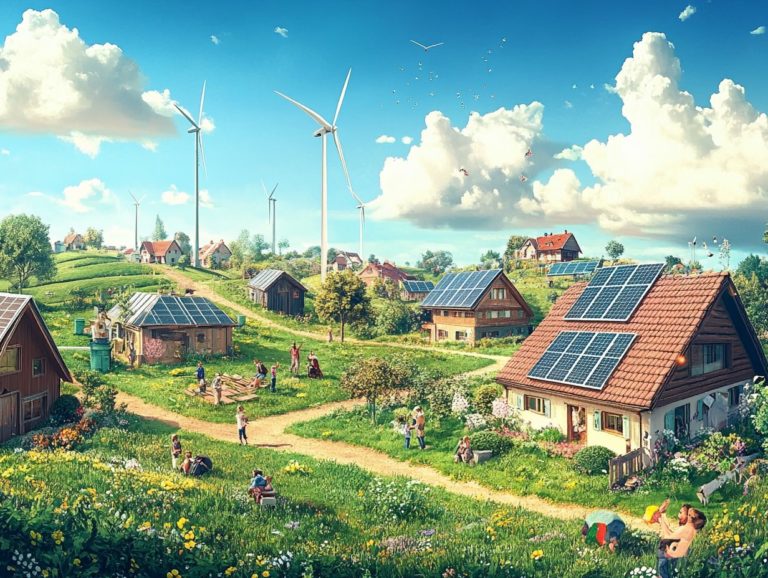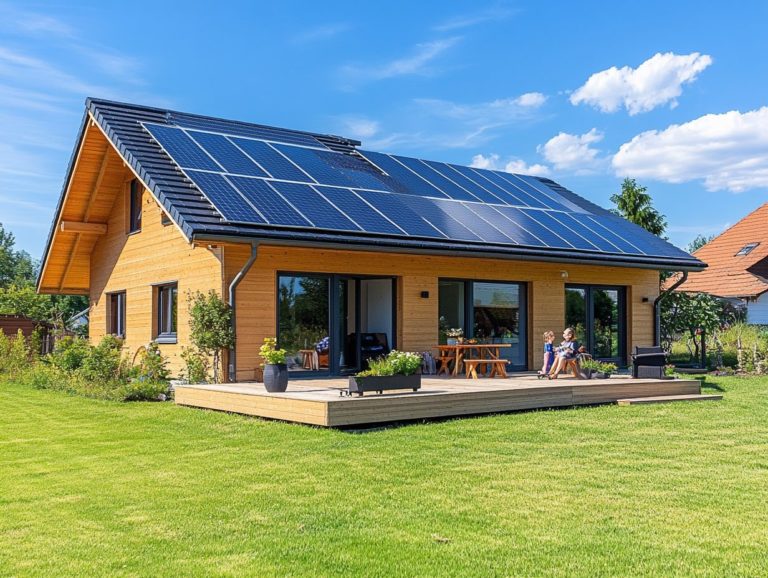“How Solar Energy is Revolutionizing Homes Today”
Solar energy is changing how you power your home. It offers a sustainable and cost-effective alternative to traditional energy sources.
This article covers the basics of solar energy. You’ll learn how solar panels work and the many benefits they provide to homeowners.
Explore different types of solar systems and gain insights into the installation process. We ll also clear up common misconceptions that may hold you back.
You ll discover exciting advancements in solar technology. Embracing this renewable resource can enhance your life and help the environment.
Contents
- Key Takeaways:
- The Basics of Solar Energy
- Benefits of Solar Energy for Homes
- Types of Solar Energy Systems for Homes
- The Process of Installing Solar Panels
- Common Misconceptions about Solar Energy
- The Future of Solar Energy for Homes
- Frequently Asked Questions
- What is solar energy and how is it revolutionizing homes today?
- How does solar energy reduce energy costs for homeowners?
- Are there any government incentives for homeowners who switch to solar energy?
- How does solar energy impact the environment?
- What are the benefits of using solar energy in homes?
- Can solar energy be used in all types of homes?
Key Takeaways:
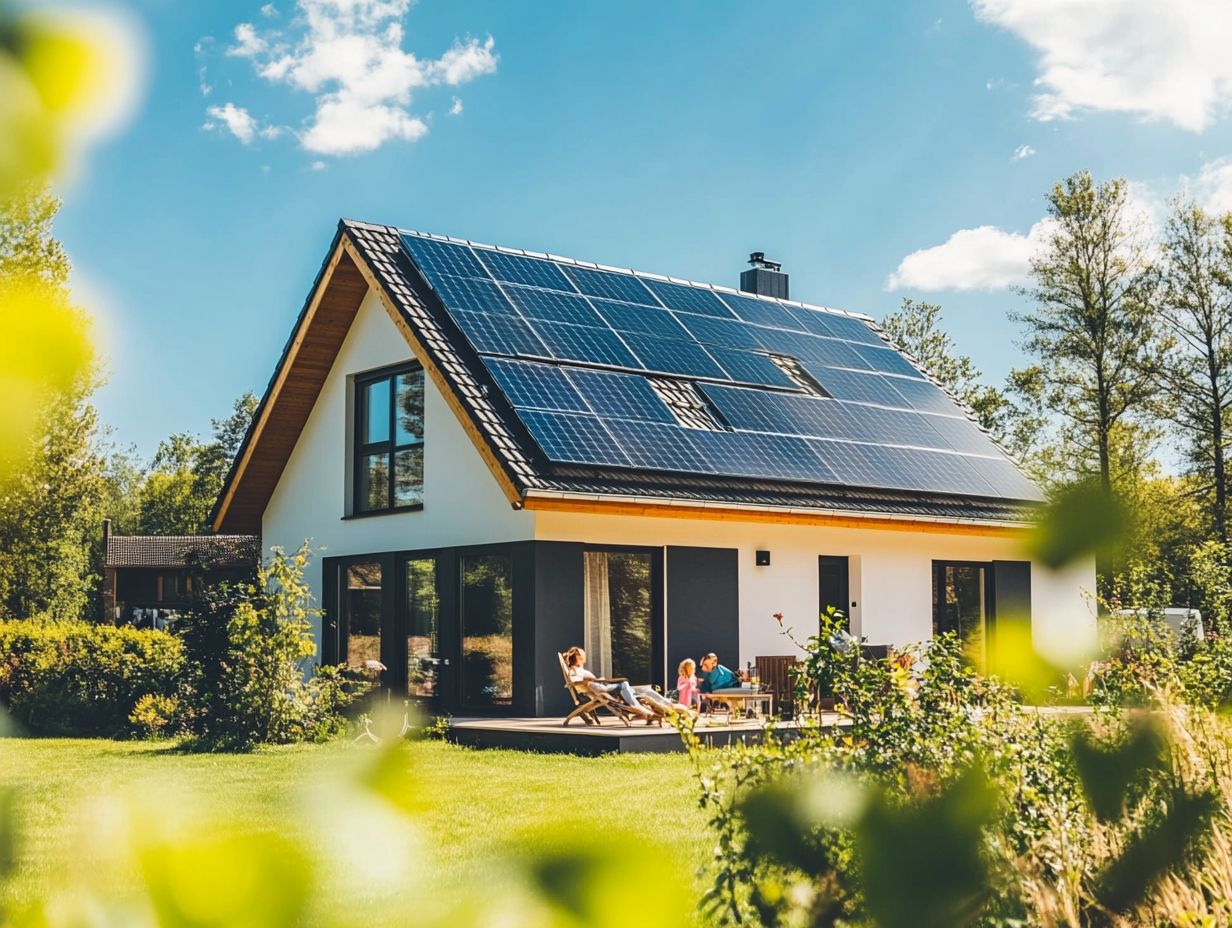
Solar energy is a renewable source that can reduce energy costs and lessen environmental impact for homeowners. Different solar systems are available, each with unique benefits and installation considerations. With advancing technology, the future of solar energy looks bright!
The Basics of Solar Energy
Solar energy is a clean energy solution that harnesses the sun’s rays. By using solar power, you can reduce your reliance on fossil fuels and lower your carbon footprint.
This renewable energy leads to savings on electricity bills and promotes energy independence. Understanding solar technology and panels is essential for making informed decisions.
Understanding Solar Panels and Their Function
Solar panels convert sunlight into electricity using special technology. This enables you to generate clean energy for various uses.
These panels contain photovoltaic cells made from materials like silicon. Sunlight excites electrons in these cells, creating an electric current.
There are different types of solar panels monocrystalline, polycrystalline, and thin-film. Each type offers unique efficiency levels based on your energy needs and available space.
Benefits of Solar Energy for Homes
Solar energy provides more than cost savings; it also reduces environmental impact and enhances eco-friendly living. By using solar power, you can lower your electricity bills and contribute to a sustainable future.
Plus, many government programs offer financial incentives to make the switch even more appealing. The benefits are substantial, both for your wallet and the planet.
Cost Savings and Environmental Impact
Investing in solar energy can lead to significant savings on your electricity bills. It also helps reduce your carbon footprint, benefiting the environment.
In addition to savings on monthly bills, you can access tax incentives and rebates at state and federal levels. This enhances your financial benefits while promoting sustainability.
Choosing solar technology reduces fossil fuel reliance and decreases greenhouse gas emissions. Your transition to solar energy supports a healthier planet for future generations.
Types of Solar Energy Systems for Homes
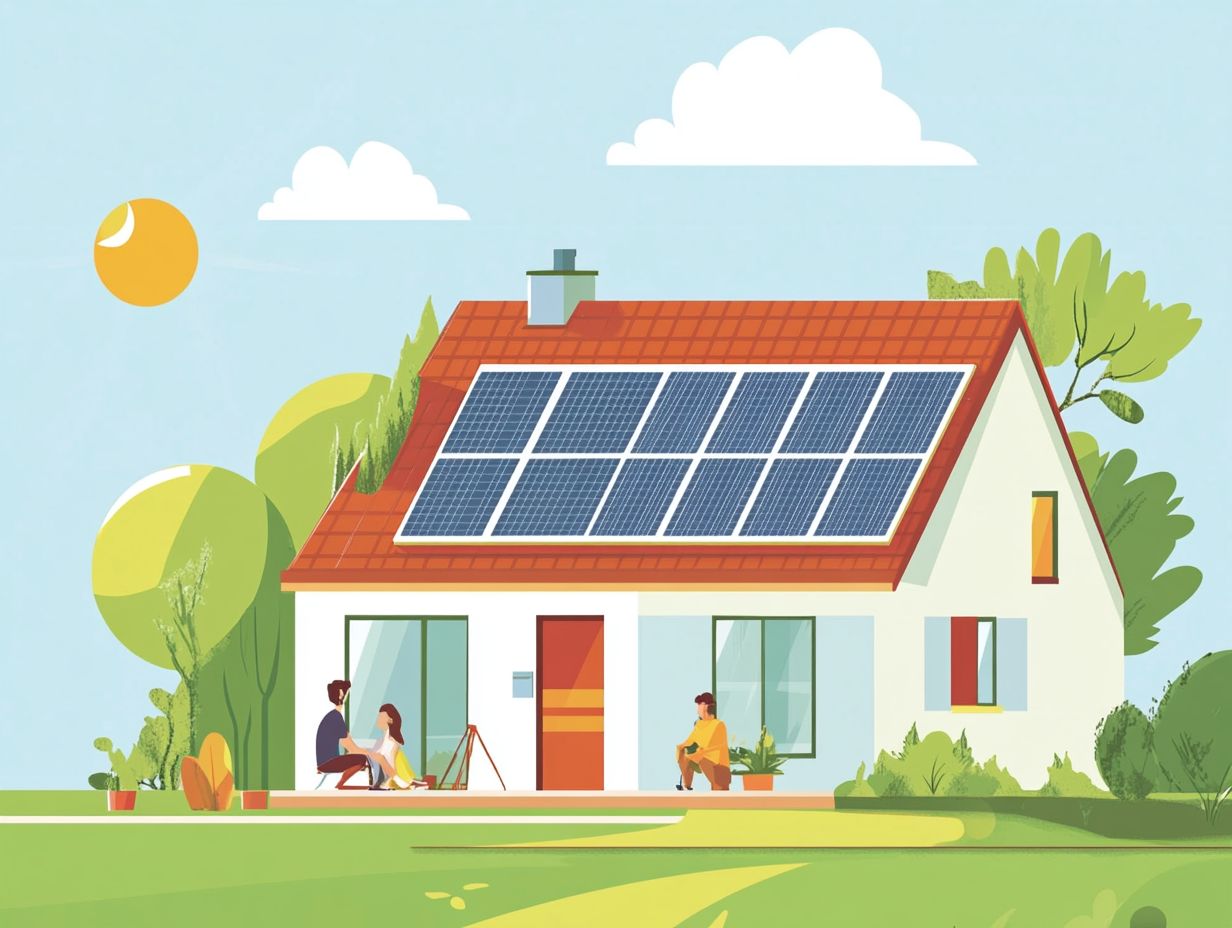
There are several solar energy systems to meet different homeowner needs. The most common types are grid-tied and off-grid systems.
Each system has its own advantages and challenges. Understanding these options helps you make the best choice for your situation.
Grid-Tied vs. Off-Grid Systems
Grid-tied systems connect seamlessly to the utility grid, allowing you to draw power when your solar generation falls short. Off-grid systems operate independently. They often incorporate energy storage solutions like solar batteries.
This independence means that if you opt for an off-grid setup, you’ll need a robust strategy to ensure you have enough power throughout both day and night.
While grid-tied options typically come with lower upfront costs, thanks to their reliance on existing grid infrastructure, off-grid systems usually require a higher initial investment due to the need for extensive storage capacity and backup generators.
That said, off-grid systems can be more efficient in remote locations where grid connections are unreliable or simply non-existent. Here, the role of energy storage becomes crucial. It affects not just how much energy is available but also the overall effectiveness of your energy use, ultimately contributing to greater self-sufficiency.
The Process of Installing Solar Panels
The process of installing solar panels includes a few key steps.
- You’ll start by assessing the solar potential of your property.
- Next, select the most suitable solar technology for your needs.
- Finally, ensure efficient energy management throughout the installation process to maximize the benefits of your solar investment.
Steps and Considerations for Installation
Key steps and considerations for your solar panel installation journey begin with selecting the right solar provider, understanding local regulations, and evaluating the best site for your solar panels to maximize energy generation.
- Start by thoroughly assessing your property’s roof or land to determine its suitability for solar installation. Take note of the angle, sunlight exposure, and any potential obstructions that could affect performance.
- After evaluating your property, learn about local regulations and incentives related to solar energy systems. This includes understanding any required permits and exploring available tax credits that could benefit you.
- Next, you’ll want to carefully choose a solar provider who holds the necessary certifications and boasts a solid reputation in your community. By comparing quotes, understanding warranties, and checking references, you’ll be well-equipped to make an informed decision, ultimately paving the way for a successful transition to renewable energy.
Common Misconceptions about Solar Energy
Despite the increasing allure of solar energy, a number of common misconceptions continue to linger. These often dissuade you from embracing the advantages of solar panels and clean energy solutions.
Debunking Myths and Addressing Concerns
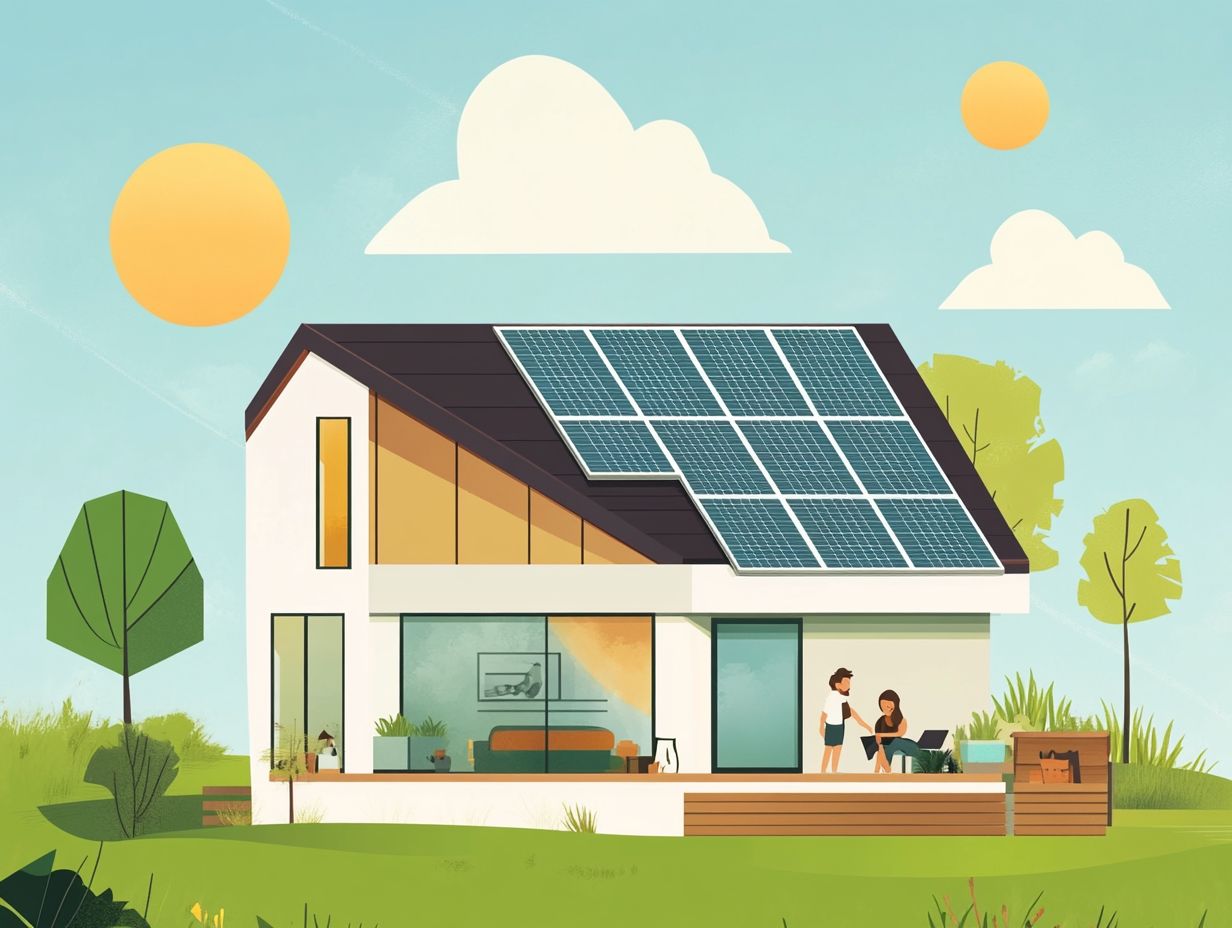
Let s clear up some myths about solar energy that might be holding you back! Addressing concerns and debunking myths about solar power is essential for enhancing public awareness and understanding of the financial incentives and ecological benefits that solar power installations provide.
Are you aware that solar panels can work even in cloudy weather? This is a common misconception. Numerous studies reveal that solar technology can effectively harness energy even in cloudy or cooler regions.
Take Germany, for example a country renowned for its overcast skies. A compelling case study there showcased a significant rise in solar energy utilization, leading to considerable reductions in electricity costs for homeowners.
As for financial viability, it s often a topic of skepticism. However, the data tells a different story. With installation costs decreasing and industry incentives on the rise, solar power can yield substantial savings over time. This makes it a smart investment, regardless of where you live.
The Future of Solar Energy for Homes
The future of solar energy for your home is exceptionally promising. It is characterized by swift advancements in solar technology, innovative energy systems, and a growing community commitment to fostering sustainable living solutions.
Explore your options today and join the solar revolution!
Advancements and Potential for Growth
Recent advancements in solar technology think innovative solar shingles, floating solar panels, and cutting-edge energy storage solutions highlight the growing potential of solar energy as a premier choice for residential construction.
These developments are fundamentally reshaping how you harness and utilize solar energy. They make it not just accessible but also remarkably efficient. By integrating devices that automate home functions and provide real-time data, you can take advantage of monitoring systems that offer detailed insights into your energy consumption and solar output.
This gives you the power to manage your energy more effectively, maximizing the use of renewable resources while reducing your dependence on the grid.
When you combine these innovations with advanced energy storage options, you gain the ability to store excess energy produced during peak sunlight hours. This means you can power your home consistently, even on cloudy days or through the night, ensuring you re always prepared.
Frequently Asked Questions
What is solar energy and how is it revolutionizing homes today?
Solar energy is a renewable energy source harnessed from the sun through solar panels. It is revolutionizing homes by providing a sustainable and environmentally friendly alternative to traditional energy sources such as fossil fuels.
How does solar energy reduce energy costs for homeowners?
Solar energy reduces energy costs for homeowners by allowing them to generate their own electricity, thereby reducing their dependence on expensive utility companies. You can also sell excess energy back to the grid, providing potential savings and even income.
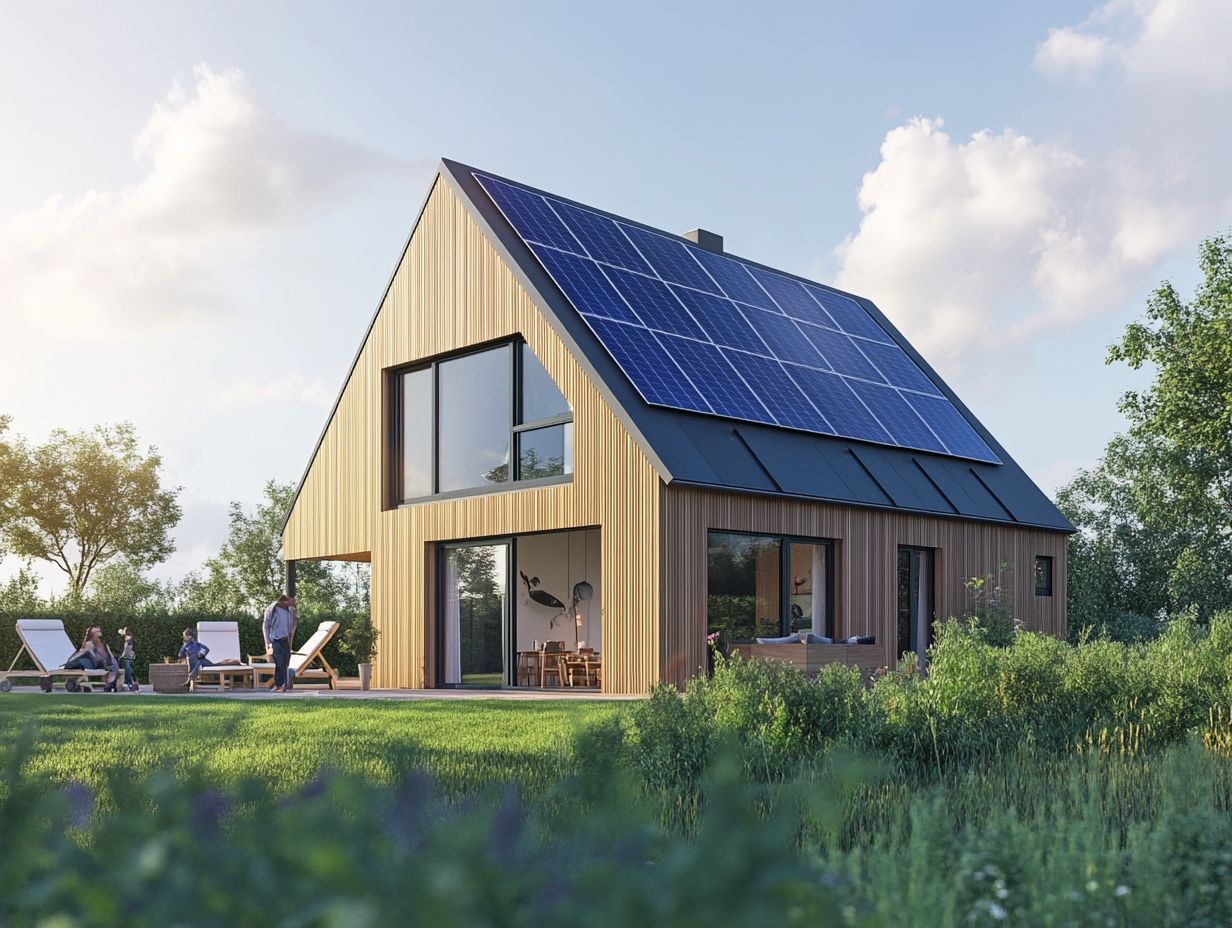
Are there any government incentives for homeowners who switch to solar energy?
Yes, there are various government incentives for homeowners who switch to solar energy, such as tax credits, grants, and rebates. These incentives can significantly reduce the overall cost of installing solar panels and make it more affordable for homeowners.
How does solar energy impact the environment?
Solar energy positively impacts the environment as it produces clean and renewable energy. This reduces reliance on non-renewable resources and decreases harmful carbon emissions. It also helps preserve natural habitats and protect wildlife.
What are the benefits of using solar energy in homes?
Using solar energy in homes offers numerous benefits, including cost savings, energy independence, reduced carbon footprint, and increased property value. Additionally, solar panels have a long lifespan and require minimal maintenance, making them a practical and sustainable choice for homeowners.
Can solar energy be used in all types of homes?
Yes, solar energy can be used in all types of homes, including single-family homes, apartments, and even mobile homes. As long as there is access to sunlight, solar panels can be installed and used to generate electricity for any type of home.
In conclusion, exploring solar energy options provides not only significant cost savings but also a positive impact on the environment. Consider making the switch today!

